Women Writers Making Waves
Swell: A Sailing Surfer's Voyage of Awakening by Liz Clark, Daniella Manini (Illustrator)
Whether they are valiant and proud, troubled and perceptive, eloquent, forthright, individualistic or altruistic, the real and imagined lives of women in these eight works—about suffragettes, crusaders, icons, makers, dreamers, and victims turned victors—are compelling, inspiring, and always emerge uniquely.
Silver Girl

Leslie Pietrzyk
The Unnamed Press
Softcover $17.00 (272pp)
978-1-944700-51-5
Buy: Local Bookstore (Bookshop)
Leslie Pietrzyk’s haunting Silver Girl begins in 1980, with a nameless narrator starting her freshman year at a prestigious Chicago-area university. The narrator escaped her economically depressed Iowa hometown, but the emotional baggage of a grim childhood and dysfunctional family continue to weigh her down like the bulky, cheaply made trunk that holds her belongings.
Silver Girl’s heroine, though nameless, is compellingly flawed. Forced into a poverty mindset, with constant anxieties about paying for food and rent, her situation is made even more difficult by the wealth of her fellow students. She feels shadowy and mousy, and like she must be morally shadowy as well in order to attract men. Her close friend Jess exudes confidence and has her pick of boyfriends, along with the heedlessness that tends to come from being born into a rich family.
Shifting from freshman year forward to 1982 and then back again, Silver Girl centers around the unusual friendship between the narrator and Jess, as well as the notorious Chicago Tylenol murders—Jess’s father’s mistress dies after ingesting a tampered capsule. The couple’s longtime affair is exposed, along with the existence of their illegitimate daughter.
The novel’s layered complexity distinguishes its anonymous protagonist and offers reasons behind her occasional lying or petty thievery. There are dark memories from the recent past, and nagging concerns about her younger sister, Grace, still back in Iowa and vulnerable to the same toxic environment. Sexually manipulated by Jess’s arrogant fiancé, she is also treated with careless concern by Jess and her parents, and ultimately learns to use them as they use her.
Though the journey isn’t easy, Silver Girl concludes with a surge of hope, like the spring thaw after an icebound Chicago winter. The troubled narrator ultimately finds a new sense of purpose and self-worth.
MEG NOLA (December 27, 2017)
Make Way for Her
And Other Stories
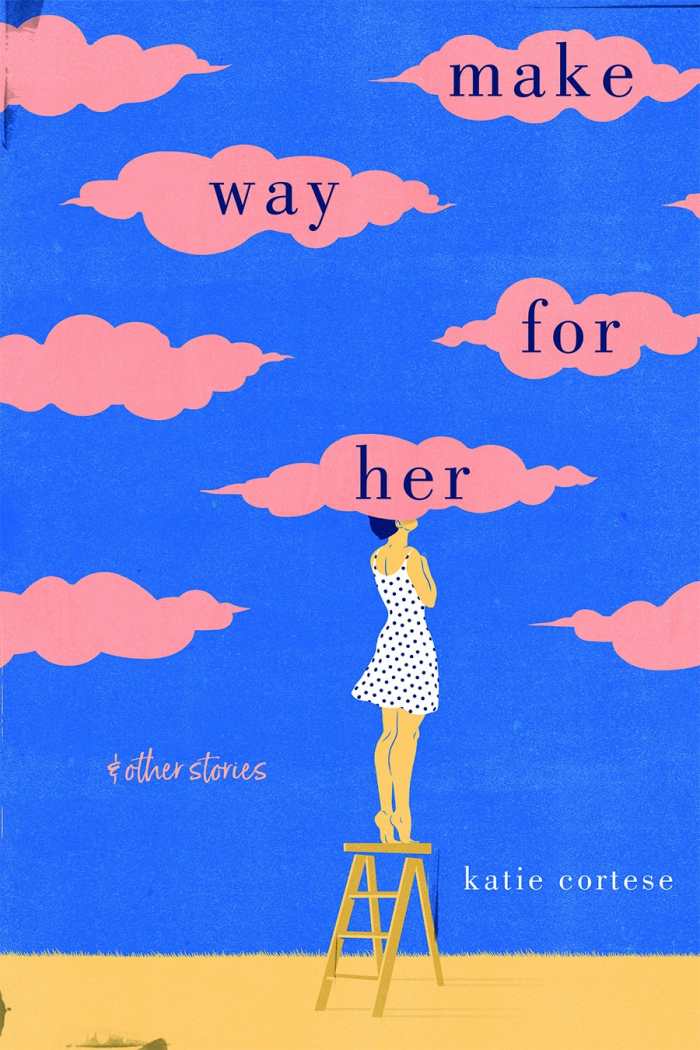
Katie Cortese
University Press of Kentucky
Hardcover $24.95 (146pp)
978-0-8131-7512-6
Buy: Local Bookstore (Bookshop)
Katie Cortese’s Make Way for Her and Other Stories offers enticing glimpses of curiously compact, womencentric fictional universes, generally focused on girls, teenagers, women, and the men who affect—but not necessarily impact—their lives.
Cortese’s writing is smoothly compelling and adapts from voice to voice. Characters range from the young and perceptive Lily, dallied with by a married author in the hothouse atmosphere of a college town; to schoolteacher Maya of “The Bounce Back,” who drives from Maine to Arizona in a vintage Corvette, looking for a fresh start. In “Lighter, Bluer, Clearer, Colder,” little Brinna is full of everyday excitement for dolls and cereal, doughnuts and snowflakes, but her baby brother suffers from a heart condition, and it frustrates her that she cannot share her own energy and health with him.
In the stories that feature teens, their conflicted worlds are taut with discovery, self-consciousness, intense emotions, and burgeoning hormones so prevalent that one character comments how they can almost be smelled in the air. First kisses and encounters are recounted with near suffocating closeness, amid waves of heartbreak and feverish crushes like “silent blooms of sudden heat to be weathered.”
Beyond adolescent intrigues, one of the collection’s best stories is “Straight and Narrow,” involving a weathered ex-con taking a basic cooking class and his surprisingly heady effect upon the course instructor. Over lessons of Hollandaise sauce and hummus, Cortese’s words skillfully simmer, avoiding a dramatic boiling point with thoughtful, wryly humorous tension.
Though the varied women of Make Way for Her are emerging and evolving, making right and wrong choices along the way, for the most part they share an appealing internal wisdom that keeps them true to their real selves, and will hopefully also keep them on the right course.
MEG NOLA (December 27, 2017)
A Good Day for Seppuku

Kate Braverman
City Lights Publishers
Softcover $15.95 (192pp)
978-0-87286-721-5
Buy: Local Bookstore (Bookshop)
In Kate Braverman’s A Good Day for Seppuku, there are few joyous moments or emotional breakthroughs. Characters keep to themselves, drift apart, or abandon each other, and though they may reunite, their meetings are generally troubled with past hurts and wounds, words unsaid, or wrong words said too often.
There is, however, a captivating undertone of dark humor to Braverman’s stories, whether it comes through description, interior narrative, or sharply bandied dialogue.
The troubled teen daughter of former rock band mates is told that her posh Beverly Hills upbringing is enviable, and that “Moses would throw his tablets down to come to this party.” A woman visiting her Idaho hometown notes how her dour mother looks “increasingly like Central Casting sent her for a farmwoman crowd shot.” A husband whose wife hates his jazz collection has to keep the music locked away from her in his study, “like vials of pathogens.”
Beyond this mordant edge, however, is a deeper, often melancholy detailing of lives and expressively haunting backdrops. A professor contemplates his ebbing career and marriage with almost obtuse detachment. A prim schoolteacher wistfully ponders getting a tattoo, then spends summer vacations searching for her daughter, lost among other prostitutes and addicts who elude the “longitudes and latitudes of their origin.”
Settings range from jaded California to the surreal Southwest, or amid the bleak shadow of Pennsylvania’s Allegheny Mountains, where “cars rust in backyards” and young men are damaged from stints in the army or prison. Place and background aren’t always inescapable, however, as a somewhat prodigal woman discovers when she becomes prodigal again: leaving her grimly dysfunctional family behind is as simple as boarding a plane, ordering a scotch and going airbound, then watching the scarred landscape shrink while returning to a world of her own making.
MEG NOLA (December 27, 2017)
In Praise of Difficult Women
Life Lessons From 29 Heroines Who Dared to Break the Rules
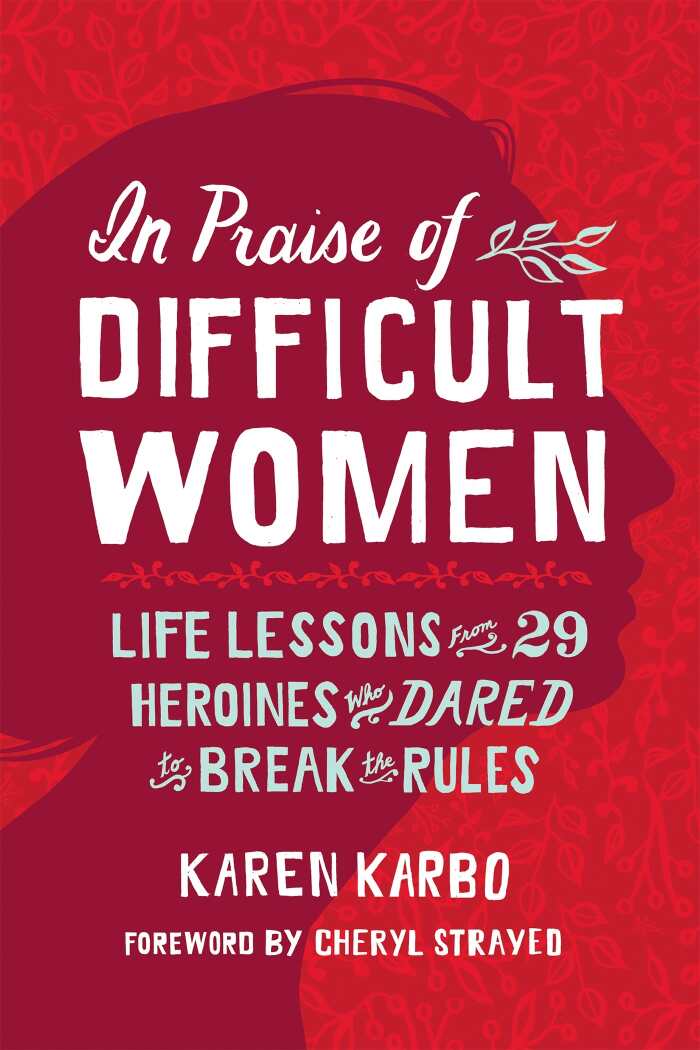
Karen Karbo
Cheryl Strayed, contributor
National Geographic
Hardcover $26.00 (352pp)
978-1-4262-1774-6
Karen Karbo’s In Praise of Difficult Women collects twenty-nine biographical profiles of women who have pushed back, broken the mold, or simply lived on their own terms. The women chosen are eclectic, while the narrative is researched and informed yet conversationally welcoming.
Among Karbo’s distinctive roster are icons like Coco Chanel, Frida Kahlo, and Josephine Baker, and political forces Eva Perón, Angela Merkel, and Hillary Clinton. Aviation pioneer Amelia Earhart is included, as well as writer Martha Gellhorn, whose perilous work as a war correspondent was preferable to her than her combative marriage to Ernest Hemingway.
Karbo’s fondness for rule breakers and benders is clear, and she defends them through character quirks and missteps—real women lead real and flawed lives. Certain profiles have extra verve, such as that of Justice Ruth Bader Ginsburg, who at eighty-five still works out in the Supreme Court gym, wears stylish collars to accessorize her formal black robe, and is brilliant yet accessible enough to merit the nickname Notorious RBG.
Karbo’s Janis Joplin is feisty and poignant—not a “dulcet” 1960s folk songstress, but more of a “monster truck with a broken muffler hauling ass down a … Southern road.” Carrie Fisher is also featured, her wit, vulnerability, and excess far more intriguing than her eternally hyped Princess Leia of Star Wars role.
Though the list is diverse, a common trait among Karbo’s forthright females is being true to one’s soul—for better or worse, but generally better. In Praise of Difficult Women offers many words of wisdom, including sage advice from fashion titan Diana Vreeland, who noted that the only right life to live is “the one you know you want, and you make it for yourself.”
MEG NOLA (December 27, 2017)
Apocalypse Child
A Life in End Times

Flor Edwards
Turner Publishing
Softcover $15.99 (240pp)
978-1-68336-768-0
Buy: Local Bookstore (Bookshop)
Flor Edwards’s Apocalypse Child is an engrossing account of growing up within the strangely insular Children of God cult. Followers of the cult, founded in the late 1960s by David Berg, accepted his twisted interpretation of Christianity and viewed their leader as a lion-headed prophet. Born into the cult in 1981, Edwards was essentially sequestered from the outside world and raised to believe that the Children of God’s lifestyle was the chosen way.
Edwards recalls a childhood spent mostly overseas, moving often to avoid the Antichrist and “outsiders,” or to spread the word of God. Her lucid, almost deceptively serene language describes her parents and extended cult family, along with an ever-growing roster of siblings—her mother gave birth to a new baby each year due to Berg’s forbidding contraception.
Beyond the collective family unit, however, lurks an undertone of children observing cult member orgies or being drawn into sexual activity themselves. There is also “flirty fishing,” or young cult women being encouraged to act as “hookers for Jesus,” seeking out lonely men to seduce and recruit or from whom to solicit a donation for providing intimate companionship. As a girl, Edwards dreaded reaching puberty and having to join this unsettling adult realm, and she lived in further terror of Berg’s predicted 1993 apocalypse.
Following Berg’s death in 1994—from illness, not the apocalypse—Edwards’s family drifted away from the group, which received unfavorable legal and media attention and was reorganizing. Edwards’s reentry into society and move to the United States as a teenager was both liberating and traumatic.
With expressive yet measured candor, Edwards conveys her sense of identity confusion and outrage during a time of readjustment, as well as her eventual journey to greater self-acceptance and spiritual peace.
MEG NOLA (December 27, 2017)
All the Women in My Family Sing
Women Write the World—Essays on Equality, Justice, and Freedom
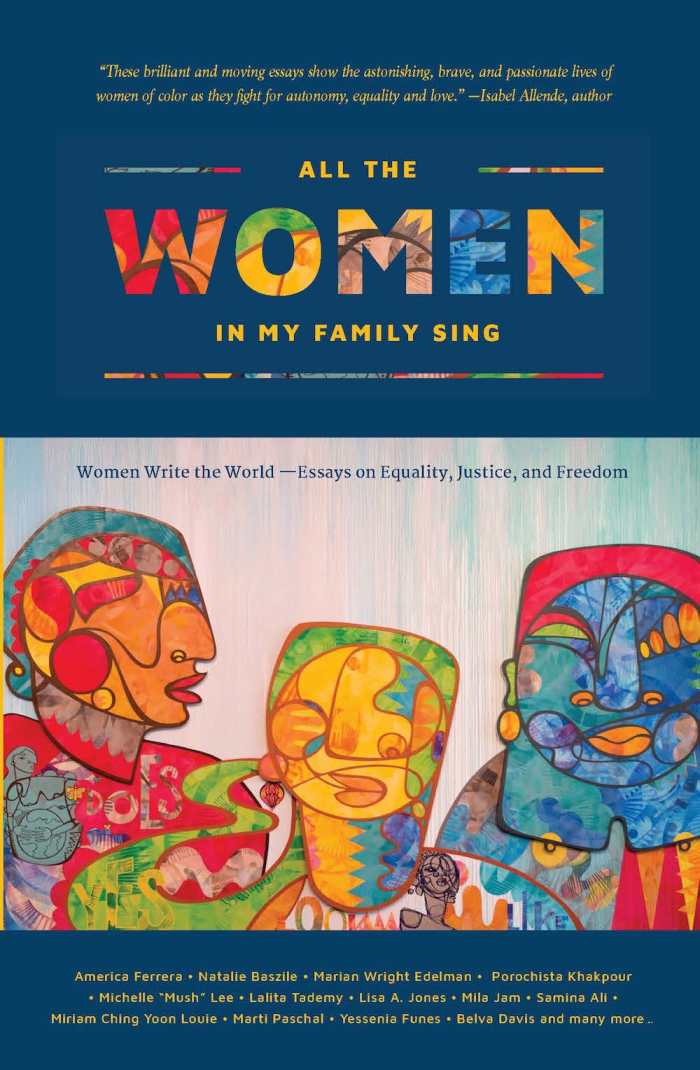
Deborah Santana, editor
Nothing But the Truth Publishing
Softcover $16.95 (366pp)
978-0-9972962-1-1
All the Women of My Family Sing is a rousing compilation by sixty-nine women of color, featuring essays that address personal and collective identity, history, place, perspective, sexuality, immigration, and modern day life.
The diverse contributors include actress-activist America Ferrera; transgender entertainer Mila Jam; novelist Samina Ali; humanitarian and children’s rights advocate Marian Wright Edelman; and Tammy Thea, a Cambodian refugee who survived the horrific Khmer Rouge regime, and who now proudly owns her own nail salon in California.
Alternating from conversational and reflective to more intense and purposeful, the essays are brief and often gem-like, many gleaming darkly with memories of prejudice, abuse, loss, or anguish. There are tales of hard-earned triumph, recollections of tougher times and pride for resilient forebearers, as well as a questioning of future goals and battles not yet won. Standards of traditional art and feminine beauty are also examined, with a focus more on truly appreciated diversity rather than tolerated inclusion or acceptance.
La Rhonda Crosby-Johnson recalls with wry eloquence being born to “Colored” parents, and through the decades being called negro, then black, and then African-American—with black always feeling the most “like home.” Phiroozeh Petigara details the irony of becoming fascinated by her Pakistani heritage, only to be admonished by her Pakistani extended family for spending too much time writing and neglecting her wifely duties. Miriam Ching Yoon Louie celebrates her warrior goddess Korean grandmother—“laundress, migrant farmer,” giver of life, and economic provider.
While some voices ring differently and others share more in a harmony, All the Women in My Family Sing offers imperative expressions from, and acknowledgment of the experiences of, women of color.
MEG NOLA (December 27, 2017)
Votes for Women!
American Suffragists and the Battle for the Ballot
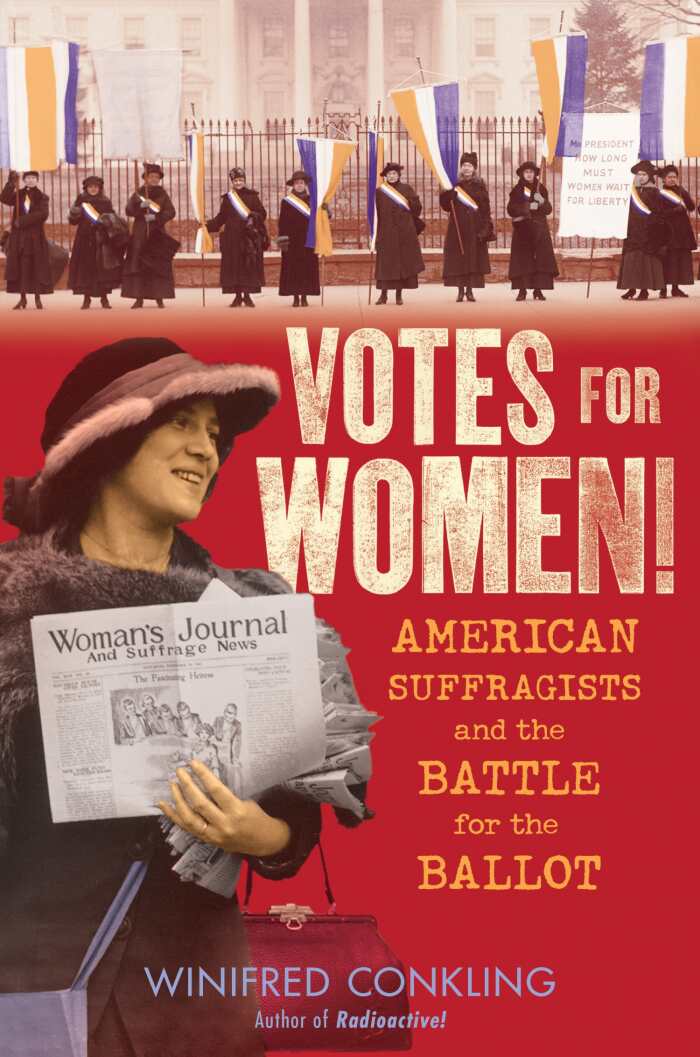
Winifred Conkling
Algonquin
Hardcover $18.95 (240pp)
978-1-61620-734-2
Winifred Conkling’s Votes for Women! details the arduous struggle for women’s suffrage in America with compelling biographical profiles of some of the movement’s key figures.
Beginning with the earlier part of the suffrage movement, Votes for Women! combines strong historical research and spirited narrative, spotlighting the lives of Elizabeth Cady Stanton and Susan B. Anthony, two remarkable women who fortuitously crossed paths and began a decades-long friendship and a crusade for female equality.
Though they had their differences in lifestyle, opinion, and general temperament, Stanton and Anthony worked tirelessly toward the shared goal of women’s suffrage. Sadly, neither would live long enough to legally cast her own vote, but as Stanton suggested, their seeds of “winter wheat” would be reaped by generations to come.
Moving into the early twentieth century, Votes for Women! follows the wave of enthusiasm that brought renewed energy to the movement. Alice Paul, from a New Jersey Quaker family, transformed the lessons of her socially conscious upbringing into action, rallying supporters to march on Washington and demand action from Woodrow Wilson. Members of this later, more diverse suffragette group were arrested, force-fed in prison, sent to dismal workhouses, or cursed at and assaulted by drunken men demanding to know who was “minding the babies.”
Other aspects of the suffrage quest, such as the contributions of African American social justice activists Sojourner Truth and Ida B. Wells, and the tenuous balancing of civil rights with women’s rights, are also well detailed. Through letters, journals, biographies, photographs, and newspaper accounts, the efforts of the known and unknown women who took up the cause of suffrage are vividly storied, concluding how Seneca Falls’s crop of “winter wheat” continues to grow and bring in its collective harvest.
MEG NOLA (December 15, 2017)
Pearls on a Branch
Arab Stories Told by Women in Lebanon Today
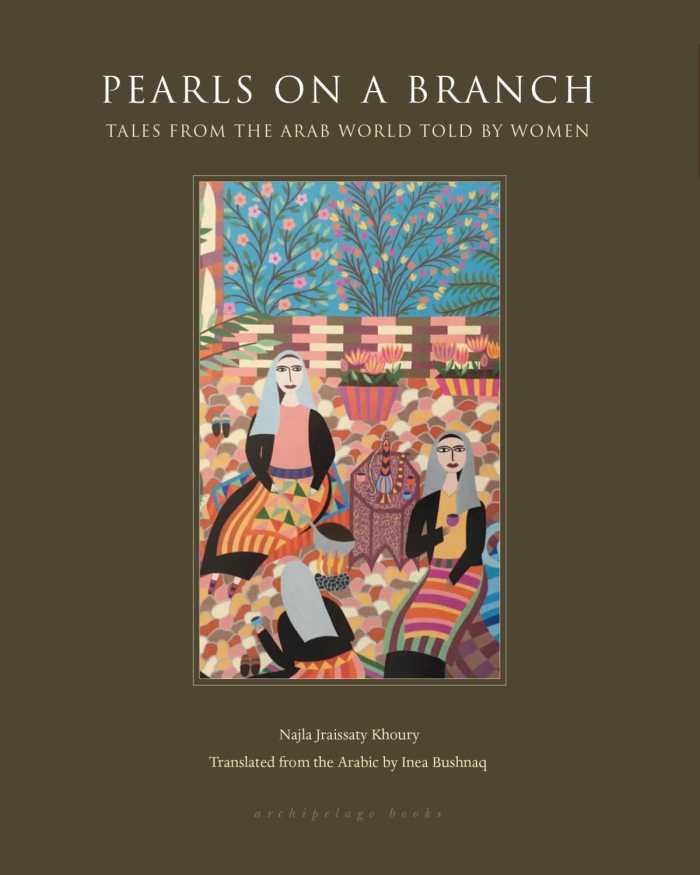
Najla Khoury
Inea Bushnaq, translator
Archipelago Books
Softcover $18.00 (270pp)
978-0-914671-96-1
Buy: Local Bookstore (Bookshop)
Pearls on a Branch: Tales from the Arab World Told by Women is a collection of thirty stories curated by Najla Khoury, who spent years compiling, polishing, and editing these primarily oral works. Retold from generation to generation, the folktales originally represented a form of shared expression and entertainment for Lebanese women, as well as a creative rebellion against the limitations imposed by their culture.
As Khoury notes, for centuries women of the Middle East were kept from pursuing education and making their own choices. This domination began with fathers, grandfathers, brothers, and uncles, continued with husbands, and could even persist further through their own sons. Women were not free to challenge men’s edicts; if they did, they could suffer severe consequences.
Pearls on a Branch includes several stories of women overcoming restrictive circumstances to triumph (or, secure a reasonably happy marriage)—using beauty and wiles, intelligence and goodness.
Kings may send their daughters to the “palace of isolation” for displeasing them, if they haven’t already killed them at birth simply for being born female. In reality, this cruel authority was rarely questioned. In the invented tales told by actual women of Lebanon, magical elements and twists of fate intercede, and both poor girls and princesses find true love.
The stories of Pearls on a Branch vary from fairy tale-esque to curiously compelling or comic. Virgin pregnancies occur from eating peacock eggs or drinking cream left out in the moonlight. Talking roses offer their beauty to humans, mice have wedding banquets, and jewels sparkle amid a backdrop of a sultan’s gardens, camels, and mysterious spirits. These fantastic tales are culturally intriguing, and particularly notable for acknowledging the unique voices of Lebanese women, past and present.
MEG NOLA (December 27, 2017)
Meg Nola

